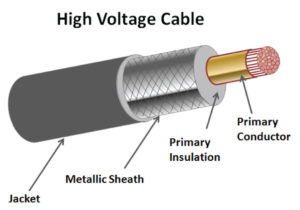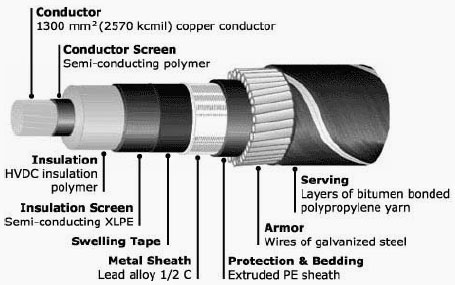Calculation of nominal cross sectional area of the high voltage cable

High voltage cable
The cross sectional area of high voltage cable where calculated shall not be less the value determined by following formula:-
S = (I SC *√t ) / K
Where,
S= Nominal cross sectional area of the conductor in mm2
I SC = Value of fault current or short circuit current in KA
T=Fault clearing time in seconds (1 second or 3 second)
K= Factor taking account of the resistivity, temperature co-efficient, heat capacity of the conductor material, initial and final temperature. Value of K (as per BS 7671) shall be taken as 0.094 for XLPE insulated Aluminium cables, 0.143 for XLPE insulated Copper cables and 0.076 for PVC Insulated Aluminium cables.
Note:–
- Wherever the application of the formula results in a non standard size a conductor to the next higher standard cross section area shall be used.
- Short circuit duration for cables must be commensurate with the tripping time of the protective deceives associated with feeder.
Let’s go through a example:
Data Available/ Require :-
Suppose Short circuit current (ISC )= 50 KA
Tripping time for system is 1 second.
Solution:
XLPE insulated Aluminium cables
As per above formula:-
S= (50× √1)/0.094 = 531.91 = 532 sqmm
So select in near size of cable like 3 core 630 sqmm .
XLPE insulation Copper cables
As per above formula
S= (50× √1)/0.143 = 349.65 = 350
So select in near size of cable like 3 core 400 sqmm .
So Finally we found two different size of high voltage cable and Cable will select as per system require. Copper cost is higher than aluminium.

Ꮩery good post. I definitely appreciate this website.
Keep writing!
Hellо, constantly i used to check blog posts here early in the dawn, aѕ
i like tо find out more and more.
what is size for single core and three core
If There is 50MVA , 66/11 kV ,12.5 %Z transformer and at 11kV 5R X 1C X 1000 mm2 / phase XLPE cable is available, then how I can prove that the size of cable is correct or not?
How to choose short circuit current
Really nice information, we also provide such information in http://www.balajiengineers.in/blogs we are heading to take electrical knowledge always